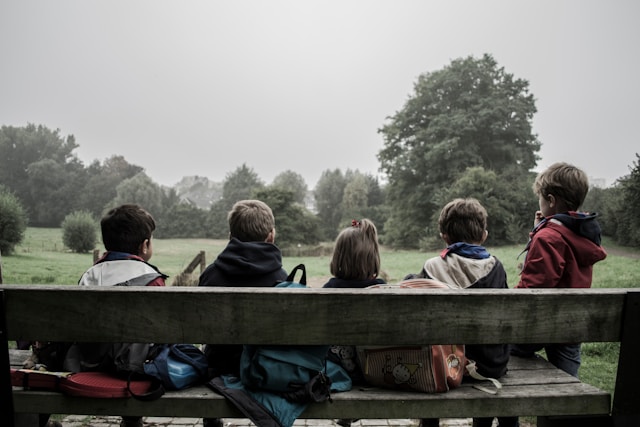
Moral development is a critical aspect of childhood, as it lays the foundation for a lifetime of ethical decision-making and social responsibility.
Children learn moral values and principles from various sources, including their family, school, and community.
The way they develop morally can have a lasting impact on their relationships, behavior, and overall well-being.
What is Moral Development?
Moral development is a fundamental aspect of a child’s growth and maturation, encompassing the journey through which they acquire the ability to discern between right and wrong, form a framework of moral principles, and navigate ethical decision-making.
This developmental process is intricate and multifaceted, influenced by various cognitive, emotional, and social factors that collectively shape a child’s moral values and behaviors.
- Read also: The Journey of Childhood – Personality Development in Childhood
- Read also: Understanding and Managing Impulsive Behavior in Children

Major Theories of Moral Development
Two significant theories that have greatly influenced our understanding of moral development are Piaget’s and Kohlberg’s.
Let’s delve into each theory and explore their key concepts:
Piaget’s theory
Jean Piaget’s theory of moral development outlines three distinct stages that children progress through:
Heteronomous Morality
In the first stage, children exhibit heteronomous morality, where they view rules as absolute and unchangeable.
They believe that breaking rules leads to immediate punishment, and they adhere strictly to authority figures’ dictates without considering the context or consequences.
Morality of cooperation
As children mature, they transition to the second stage, known as the morality of cooperation.
Here, they begin to understand that rules are created to benefit everyone and are essential for maintaining social order and harmony.
They recognize the importance of cooperation and fairness in social interactions, and they strive to abide by mutually agreed-upon rules.
Morality of mutual respect
In the final stage, children develop a morality of mutual respect, where they acknowledge that rules are intended to promote mutual respect, understanding, and cooperation among individuals.
They recognize the importance of empathy, perspective-taking, and compromise in resolving conflicts and fostering positive relationships.
Kohlberg’s theory
Lawrence Kohlberg’s theory of moral development expands upon Piaget’s work and outlines three levels, each consisting of two stages:
Preconventional morality
In the preconventional stage, children focus primarily on avoiding punishment and seeking rewards.
They adhere to rules to avoid negative consequences or gain personal benefits, demonstrating a self-centered perspective on morality.
Conventional morality
As children progress to the conventional stage, they begin to internalize societal norms and rules.
They follow rules to maintain social order and uphold authority, prioritizing conformity and obedience to societal expectations.
Postconventional morality
In the postconventional stage, individuals develop a personal moral code based on abstract principles of justice, fairness, and human rights.
They question societal norms and authority if they conflict with their deeply held moral values, demonstrating a capacity for independent moral reasoning.

Factors Influencing Moral Development in Children
The development of moral values and principles in children is influenced by a variety of factors that shape their understanding of right and wrong.
Let’s explore some of these key influences:
Parenting styles
Parenting styles play a crucial role in shaping children’s moral development.
Research suggests that authoritative parenting, characterized by warmth, responsiveness, and clear expectations, fosters positive moral outcomes in children.
In contrast, permissive parenting, which is overly lenient and lacks structure, may hinder moral development by failing to instill a sense of responsibility and accountability.
Role models
Role models, including parents, teachers, and siblings, serve as powerful influences on children’s moral development.
Children learn moral values through observation and imitation of the behavior demonstrated by these influential figures.
Positive role models who exhibit integrity, empathy, and respect for others can inspire children to adopt similar values and behaviors.
Conversely, negative role models or inconsistent behavior may confuse children and undermine their moral growth.
Peer relationships and social interactions
Peer relationships and social interactions provide valuable opportunities for moral learning and development.
Children learn from their peers through observation, cooperation, and conflict resolution.
Social norms and values within peer groups influence children’s attitudes and behaviors, shaping their understanding of acceptable conduct and moral principles.
Cultural background and societal norms
Cultural background and societal norms significantly influence children’s moral development.
Cultural values, traditions, and beliefs shape children’s understanding of morality and guide their behavior within their cultural context.
Children learn moral values through participation in cultural practices, rituals, and traditions, absorbing societal expectations regarding ethical conduct.

Tips for Parents and Educators
As parents and educators, nurturing children’s moral development is a vital responsibility.
Here are some practical tips to guide and support children on their moral journey:
Model good behavior
Children learn best by observing the behavior of trusted adults.
Set a positive example by demonstrating kindness, honesty, respect, and compassion in your interactions with others.
Your actions speak louder than words, so strive to embody the moral values you wish to instill in children.
Encourage empathy
Empathy is a cornerstone of moral development, enabling children to understand and consider others’ feelings and perspectives.
Encourage empathy by teaching children to empathize with others’ experiences, acknowledge their emotions, and demonstrate kindness and compassion in their interactions.
Use positive reinforcement
Acknowledge and praise children for demonstrating good moral behavior and making ethical choices.
Positive reinforcement reinforces desired behaviors, encouraging children to continue acting in ways that align with moral principles.
Celebrate acts of kindness, honesty, and empathy, reinforcing the importance of moral values in everyday life.
Encourage critical thinking
Engage children in discussions about moral dilemmas and ethical decision-making.
Encourage them to think critically, consider different viewpoints, and weigh the consequences of their actions.
By fostering critical thinking skills, children learn to navigate complex moral issues and make informed and thoughtful choices.
Foster a sense of community
Promote a sense of belonging and social responsibility by encouraging children to participate in community activities and service projects.
Engage them in activities that emphasize the importance of cooperation, collaboration, and contributing to the well-being of others.
By fostering a sense of community, children develop a deeper understanding of their role in society and the value of helping others.
Set clear expectations
Establish clear expectations and guidelines for behavior that reflect your family’s or classroom’s moral values.
Consistently reinforce these expectations through positive reinforcement and gentle guidance when needed.
Clear expectations provide children with a framework for understanding right and wrong and help create a nurturing and supportive environment for moral development.

- Read also: 6 Strategies on How to Stop Attention-Seeking Behavior in Children
- Read also: The Fine Line of Discipline: 5 Reasons Why Parents Are Strict
Conclusion
Moral development in children is a complex process influenced by various factors.
Understanding the major theories of moral development and the factors that shape it can help parents and educators support moral growth in children.
By modeling good behavior, encouraging empathy, and fostering a sense of community, we can help children develop a strong moral compass that will guide them throughout their lives.


